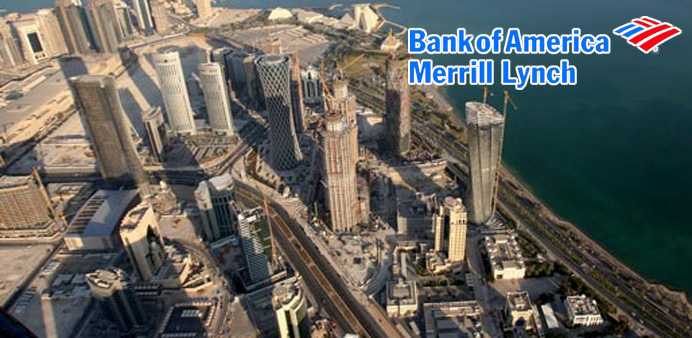By Santhosh V Perumal/Business Reporter
Qatar remains most resilient Gulf economy as its macroeconomic data outperform peers, according to Bank of America Merrill Lynch.
“We expect Qatari macro to continue outperforming GCC (Gulf Co-operation Council) peers, as 2022 FIFA World Cup capex (capital expenditure) spending appears set to continue,” Jean-Michel Saliba, Middle East and North Africa (Mena) economist of BofAML said. Qatar’s fiscal and external breakeven oil price remains among the lowest in the GCC, at $66 per barrel (bbl) and $60bbl respectively, he said.
Finding that regionally, stabilising oil market share “increases downside risk” to oil prices, BofAML said higher uncertainty may have a “negative” wealth effect and implications on business and consumer confidence, while lower marginal oil liquidity weakens money supply and private sector credit growth.
On the other hand, it said the GCC markets presently represent a buying opportunity, particularly with appealing stock valuations and stronger earnings momentum.
“There are broad based buying opportunities, but stock selection is becoming key. We retain our bias for markets with robust macro, attractive valuations, consistent earnings delivery and/or superior earnings growth,” it said.
“The GCC macro story is likely to have peaked if oil prices stay low for long,” the bank said, adding the risks are primarily low oil prices and geopolitical threats, which continue to remain.
Twin deficits are expected, as well as weaker real gross domestic product growth and softer non-hydrocarbon sector growth on greater fiscal policy prudence, BofAML said, adding a prolonged period of low oil prices and regional geopolitical threats remain the primary risks.
The realisation of external risks and global risk aversion may cut market access to Dubai Inc, risking a credit event, it said.
BofAML said the UAE remains the most preferred Middle East and North Africa market, offering long term growth and Kuwait is a preferred market amongst the GCC frontier markets; while Saudi Arabia represents selective market opportunity, particularly in the consumer space.
“In our view, the UAE economy is likely to soft land this year, as suggested by only modest deceleration in high-frequency indicators. The near-term direct impact of lower oil prices on UAE is more muted than for GCC peers,” Saliba said.
However, the indirect impact through lower regional and domestic liquidity, real estate, external sector and indebtedness would be more pronounced if oil prices remain low for long, he cautioned.
Although Dubai should be able to tackle refinancing challenges, he said nevertheless, it expects large projects to be gradually phased over time.
Egypt benefits cyclically from lower oil prices but still needs to mobilize external financing, given its geopolitical importance, it said, adding key remains to advance the structural reform agenda and mobilising external finance.

